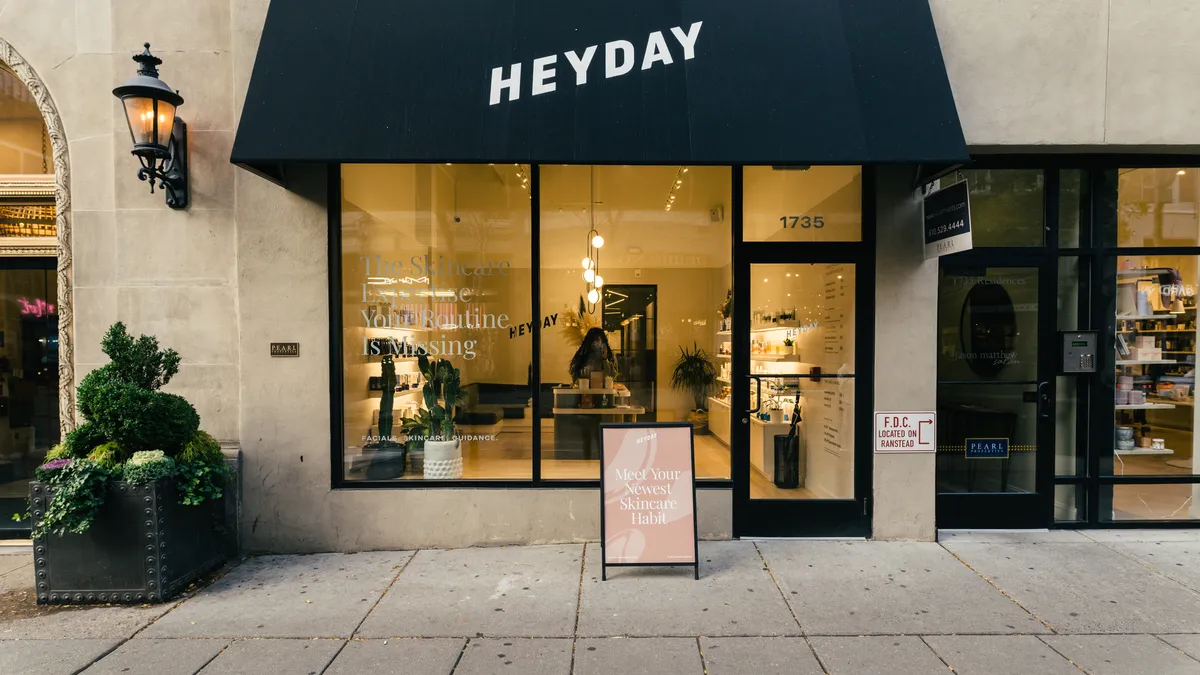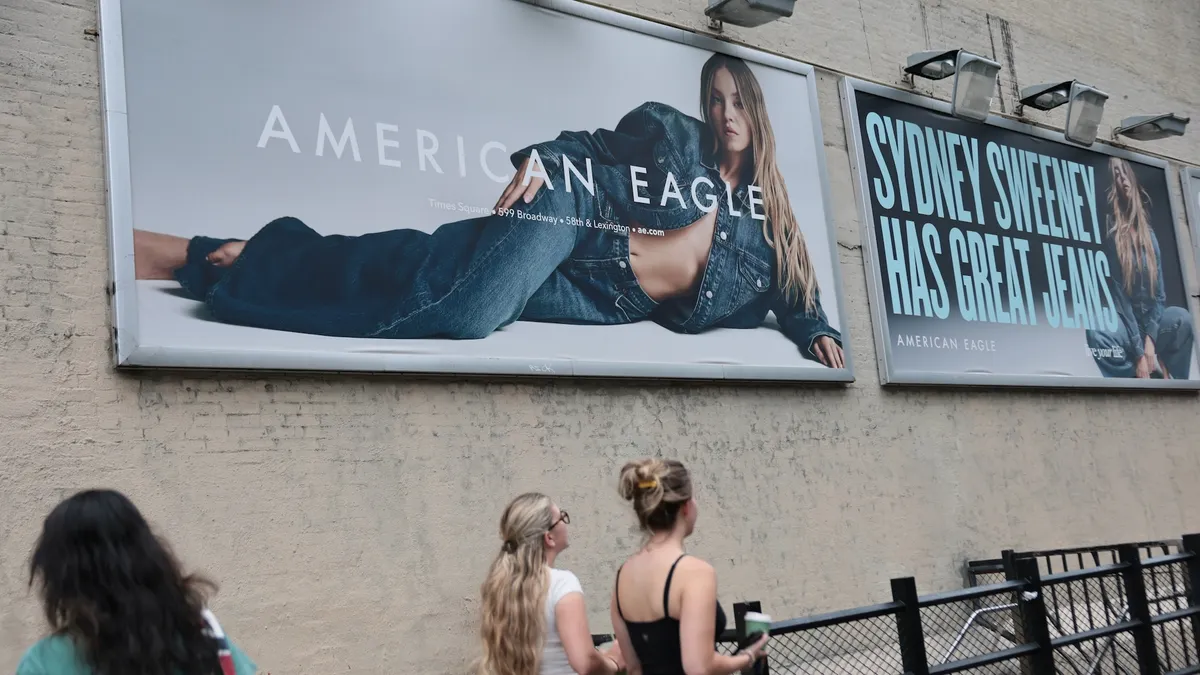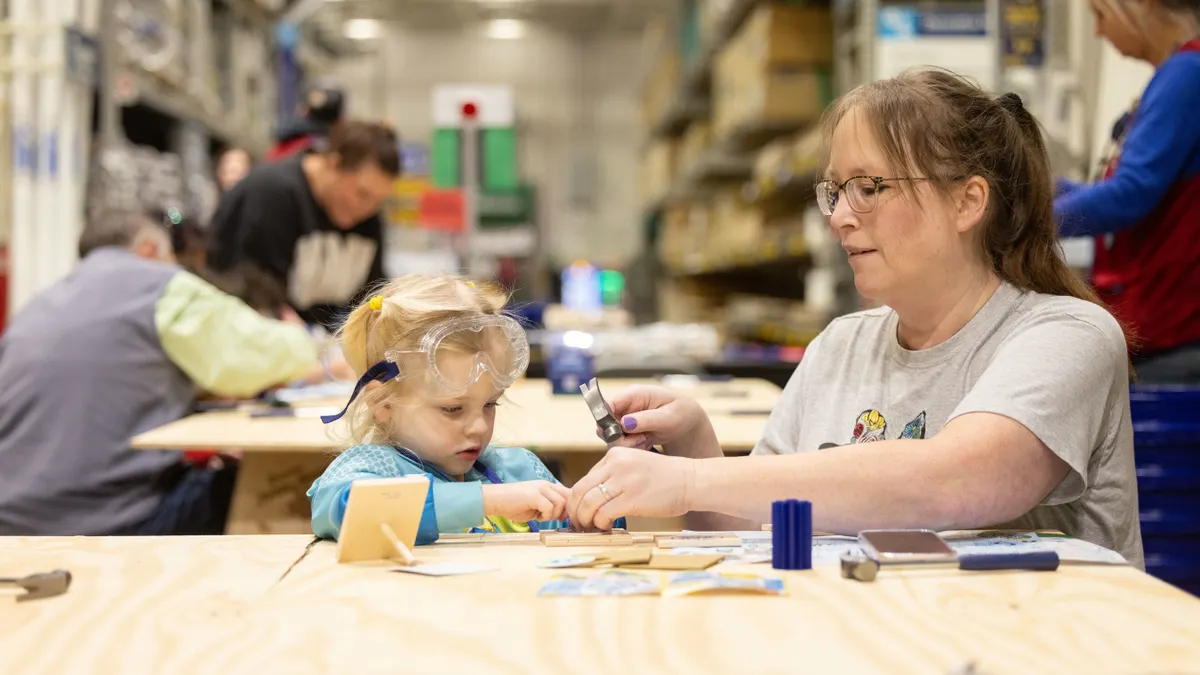While the pandemic has boosted e-commerce beyond anyone's expectations, add skincare company Heyday to the list of retail startups that are taking this time to plan physical expansion.
Along with securing $20 million in Series B funding, Heyday on Tuesday also announced plans to scale to "hundreds of stores" in the next five years via franchising, according to a company press release. Heyday, which describes itself as "taking the facial out of the spa and into people's lives," emphasizes a personalized approach to skincare, including putting estheticians front and center to provide skincare and product recommendations. The company currently has 10 stores.
Its locations are intended to be more inviting and accessible than traditional spas, and focus on conversations between customers and experts, who give advice while performing treatments. Customers can also purchase products in the stores or online. Skincare is the sole focus of Heyday's services, and it looks to appeal to both men and women. Right now, men make up about 20% of the business.
It's not the only service-based startup in the retail space to expand via franchise in recent years. Madison Reed, which sells its own hair color products and operates hair color salons, said in 2019 it would open 600 of its Color Bars by 2024, the vast majority of which would be franchises. The company has not wavered from that thesis, despite the pandemic.
The key is making sure the experience is consistent, and Heyday is entrusting that goal to two startup execs — Sean Bock, the company's chief development officer, who previously oversaw franchise-led growth at Drybar; and Maureen Sullivan, a new hire who will lead the expansion and previously served as president and chief operating officer at Rent the Runway.
"No one actually knows with Drybar if it's a franchise or a company-operated door, so that's certainly the experience we're looking to replicate at scale," Adam Ross, CEO and co-founder of Heyday, said.
Level 5 Capital Partners, which led the funding round, has committed to investing in 40 stores in the next five years, but the eventual goal is much larger. Ross cited European Wax Center and Massage Envy — which have more than 800 and 1,100 locations, respectively — as "a North star" for what Heyday's footprint could eventually look like in the U.S.
"I think we sort of reached this juncture in terms of what kind of company do you want to be? Do you want to be an innovation company or an operating company?" Michael Pollak, chief experience officer and co-founder of Heyday, said. "And I think that when you have hundreds of stores nationwide, you're likely more focused on operations than you are innovation."
Thus, the appeal of franchising, which should allow the company to continue to focus on innovation. Retention and referral rates have always been some of the most important metrics the company measures its stores by, according to Ross — he says the company has spent hardly any money on marketing because it relies on word of mouth, and that pre-COVID, a third of clients were coming monthly for facials — so franchising stores out was not a decision that was made lightly.
"I think the more we got into it and looked at other service-based businesses across the U.S., what we generally found was outside of a company's home markets, basically, you always saw a franchised door wouldn't just perform better financially, but the metrics around client engagement, team turnover, overall satisfaction were always higher under the stewardship of a franchisee," Ross said. "I think part of that is they've just got an alignment of interests with ours in a way: They're hyper focused on that experience, as are we. I think franchising can get a bit of a bad rap. Not done the right way, it won't work, which is, I think, why we're so focused on being thoughtful about it."
The skincare company has taken the pandemic as a time to make changes to its in-store experience, as well as upgrade booking platforms and other systems, to help set up the next year. Since the company operates in a service-based space, its locations were closed until last September, and currently only its New York and Philadelphia stores are open, as COVID-19 continues to rage throughout the U.S.
Existing investors Lerer Hippeau and Fifth Wall Ventures also participated in the latest funding round, and while franchising is a big part of the company's plans, some funding will also go toward creating a better online experience that allows Heyday to put customers in touch with estheticians online.
"We strongly believe that its best in class business model is laying the foundation to meet the consumer wherever they are," Managing Partner of Lerer Hippeau, Ben Lerer, said in a statement. "In a local Heyday store or virtually, the company will lead an accelerated growth category with the mission to democratize skincare for the modern consumer."
Online, that means moving beyond its current site's capabilities in favor of personalizing skincare routines and recommendations using customer data and online access to estheticians. Notably, Heyday does not want to be like the major beauty players of the day.
"You could go to an Ulta, Sephora, Birchbox, Amazon, Bluemercury, any online website, and it's just a lot of products," Ross said. "It's a lot of search functionality. There is zero point of view, there is zero content, there's zero education. It's very tough to figure out as a customer what you should buy and how to use it. There's a 'more product is better' approach … we want to just come at it very differently."
Clarification: This story has been updated to reflect more recent information from the company about which stores are open.
























